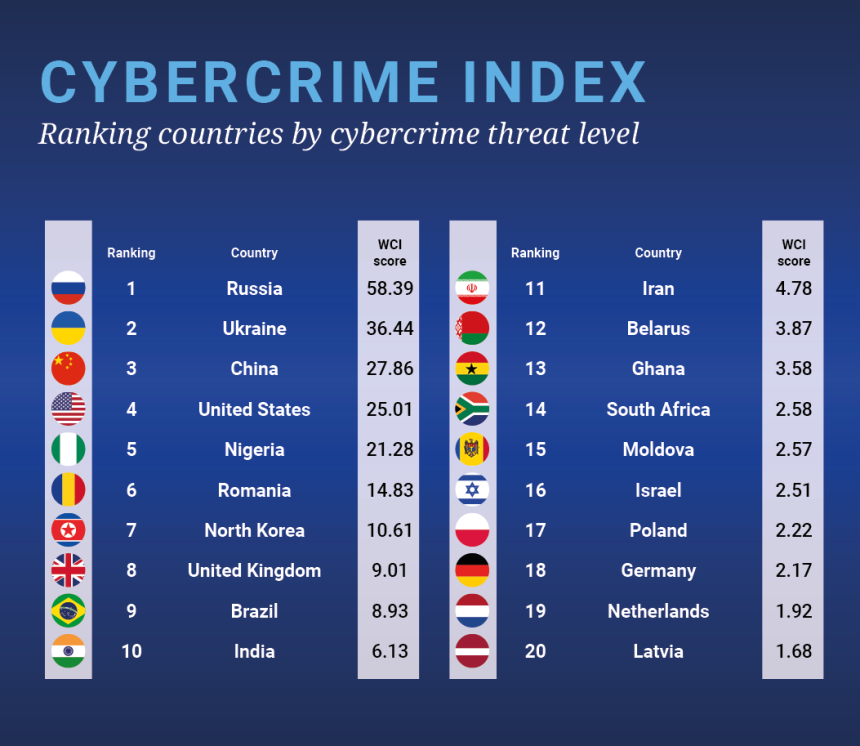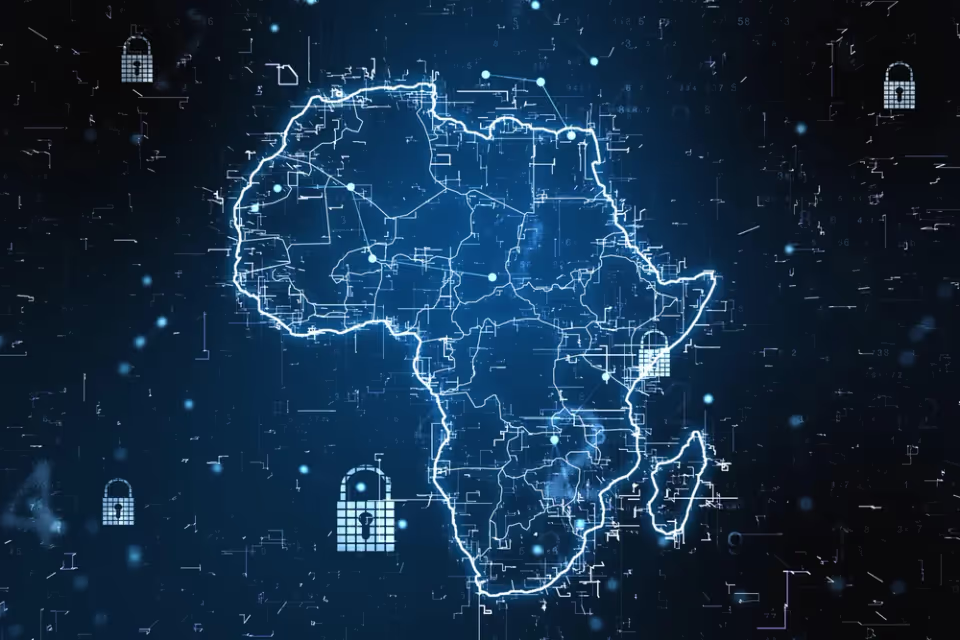Last week, our publisher Benjamin Dada joined The Chinese in Africa Podcast to ̶ ̶ ̶ ̶ ̶ dive into the latest happenings with Chinese tech on the continent.
They discussed some hot topics, including the shutdown of LetsChat, TikTok’s sister app and why Chinese firms are still dominating the African smartphone market, even over competitors.
Take some time to listen to the conversation
In this letter, we will explore:
- cybercrime threat level in Africa
- why Moderna is halting vaccine plant project in Kenya
- Starlink’s struggles in Zimbabwe
We also have updates on the state of funding in Africa, and other noteworthy information and several opportunities.
The big three!
#1. Three African nations are among the world’s top 20 cybercrime hotspots
The data: A new report flags Nigeria, Ghana, and South Africa as cybercrime hotspots. The World Cybercrime Index, by Oxford and New South Wales universities, ranks them among the world’s top 20.

What’s the methodology? The Index considers a wide range of cybercrime, including tools (malware, botnet access), attacks (denial-of-service, ransomware), data theft (hacking, phishing), scams (fake emails, online auctions) and money laundering (credit card fraud, money mules).
The World Cybercrime Index relies on the expertise of 92 cybercrime investigators and intelligence specialists worldwide. These specialists identified five key cybercrime categories and nominated countries they believed to be major sources for each. They then ranked these countries based on their cybercriminals’ impact, skill and professionalism.
According to Jonathan Lusthaus, co-author of the report and a professor of Global Sociology at Oxford University, cybercrime’s anonymity and secrecy make traditional data collection methods unreliable.
“They are actively hiding,” Lusthaus explained. “If you try to use technical data to map their location, you will also fail, as cybercriminals bounce their attacks around internet infrastructure across the world. The best means we have to draw a picture of where these offenders are located is to survey those whose job it is to track these people.”
Why it matters: Miranda Bruce, co-author of the World Cybercrime Index, believes the research will be crucial in “lifting the veil” on cybercriminals and helping the fight against profit-driven cybercrime.
The Index provides valuable insights into the geographic distribution of cybercrime, revealing specialisation in different crime types across various countries. By continuously tracking these trends, researchers hope to identify emerging hotspots and enable preventative measures in at-risk nations before major cybercrime problems arise.
Zoom out: African fintech startups, like Flutterwave and Interswitch, faced costly cyberattacks in 2023, losing millions. In response, industry leaders united to develop a common strategy against fraudulent transactions within their networks.
An anonymous source told Bendada.com last year that a prototype platform is already in place, and they’re currently forming a board of trustees.
#2. Moderna halts $500M vaccine plant project in Kenya
The news: Moderna has paused its $500 million mRNA vaccine facility planned for Kenya. The American biotech firm cites a decline in Africa’s COVID-19 vaccine demand as the reason for the suspension of the project.
“Moderna has not received any vaccine orders for Africa since 2022 and has faced the cancellation of previous orders, resulting in more than $1 billion in losses and write-downs,” the firm said in a statement seen by Bendada.com.
Moderna’s Kenyan facility isn’t the only victim of COVID-19’s decline. Remember 54gene, the Nigerian genomics startup? In 2022, when COVID testing boomed, they were a major provider. But as demand dropped, they were forced to lay off 30% of their staff and eventually shut down entirely.
Know more: While pausing the Kenya facility, Moderna isn’t abandoning business in Africa. The company says it’s now pivoting its focus from solely COVID-19 vaccines to developing vaccines for public health challenges in Africa, prioritising diseases like HIV and malaria.
Back in 2022, when Moderna announced the Kenyan facility, the World Health Organisation projected a steep decline in COVID-19 deaths across Africa, with a 94% mortality rate reduction. However, a grim reality persists: malaria continues to claim the life of a child under five in Africa nearly every minute. Hence the need for the pivot. “This approach will allow Moderna to better align its infrastructure investments with the evolving healthcare needs and vaccine demand in Africa,” the company added.
#3. Starlink operations in Zimbabwe
The news: Starlink, the satellite internet provider from SpaceX, was forced to suspend its Zimbabwean operations last week. The Postal and Telecommunications Regulatory Authority of Zimbabwe (POTRAZ) reportedly directed Starlink to cease service until it obtains the necessary licensing.
Know more: In September 2023, the country’s information minister confirmed that Starlink had applied for a license. However, POTRAZ’s recent actions paint a different picture. In January, the regulator outrightly outlawed the service and threatened to arrest users and vendors. Further solidifying their stance, a Chinese mining company using Starlink was fined and had its equipment confiscated in February.
Zoom in: Although Gift Machengete, POTRAZ’s director-general said she has met with SpaceX CEO Elon Musk, it is unclear when the service will be restored in the country. “It was a very cordial meeting and he understood what we were doing. I don’t think it will take a very long time once they have submitted,” Machengete told Bloomberg.
Currently, Starlink service is unavailable in Zimbabwe and several other African nations, including South Africa due to licensing issues.
State of Funding in Africa
Last week, SunCulture, a Kenyan climate tech startup, raised $12 million as part of its Series B round which was a mix of equity and debt.
The funding was led by InfraCo Africa and Savant Ltd, other investors who participated in the round are Acumen Funds, Reed Hastings, co-founder of Netflix, and Eric Schmidt, former CEO and Chairman of Google.
Other funding deals that took place last week include:
- Affinity, a Ghanaian fintech secured an undisclosed amount from the Africa-focused impact investment firm Renew Capital.
- Rivia, a Ghanaian healthtech startup acquired Waffle, a software-as-a-service provider for small and medium-sized businesses, in an undisclosed deal.
Noteworthy
Here are other important stories in the media:
- Nigeria’s newly proposed national ID gets cold reception: Some analysts are sceptical, questioning whether this initiative will fare any better considering the ongoing challenges with accessibility faced by many Nigerians in obtaining the current physical cards.
- How Verod-Kepple Africa wants to invest its $60 million fund: Verod-Kepple Africa Ventures, a pan-African VC firm, has secured $60 million for its first fund to invest in Series A and Series B startups beyond the “Big Four” markets.
- Binance seeks release of detained exec in Nigeria: The global crypto exchange has urged the Nigerian government to release Tigran Gambaryan, the detained head of its criminal investigations team, who is currently held at the Kuje Correctional Facility in Abuja, the nation’s capital city.
- Operators try to end Sudan’s months-long telecoms blackout: Mobile network providers affected by Sudan’s ongoing telecommunications dry spell are making efforts to resume operations amid a crisis that has perturbed the country for nearly a year.
Opportunities
Jobs
We carefully curate open opportunities in Product & Design, Data & Engineering, and Admin & Growth every week.
Product & Design
- Lokalise — Senior Product Designer, Remote
- Yassir — Product Design Manager, Remote
- Jobberman — Head of Product, Abuja
Data & Engineering
- Fairmoney — Backend Engineer, Lagos
- Stears — Fullstack Engineer, Remote
- Branch — Backend Engineer, Kenya (Remote)
Admin & Growth
- Piggyvest — Product Marketing Manager, Lagos
- EarlyNode — Social Media Copywriter, Nigeria (Remote)
- Chowdeck — Sales Associate (South-South), Nigeria
Other opportunities
- AI in Journalism: The Centre for Journalism Innovation and Development is inviting journalists and technologists to apply for an AI in Journalism Fellowship. Deadline: April 19, 2024.
- App testers in Ghana and Nigeria: Earn up to $30 daily by testing mobile apps in the Diaload Tester Pool program. Diaload is a software development company revolutionising app testing and collaboration is looking for people with a keen eye for detail and a love for mobile apps to provide valuable feedback to app development teams.
- For early-stage founders: Norrsken Accelerator is accepting applications for the 2024 cohort. The 2024 cohort will take place at Norrsken House in Stockholm from July to September 2024. Selected startups will receive up to $125k in funding.
Thanks for reading this edition.
Know someone who might find it useful? Don’t hesitate to share.
Get passive updates on African tech & startups
View and choose the stories to interact with on our WhatsApp Channel
Explore




